The Effects of Aprakasa Grahas and Upagrahas by Sarajit Poddar
Following are the practical demonstrations of the effect of the Aprakāśagrahas and Upagrahas on someone’s life. One may ask, is it truly important to judge these effects? Why are many Jyotiṣīs not concerned about them and can still make good predictions? These are logical questions, but they are not difficult to answer. Jyotiṣa is a vast ocean, and it is almost impossible to consider everything in making a prediction.
It will take ages to issue even one prediction if we accommodate everything in making a prediction. Human life is also equally complex, and that is reflected in the principles of Jyotiṣa. It isn’t easy to decipher everything in human life. One can be happy and sad simultaneously, and two different influences indicate that. One Jyotiṣī can predict happiness based on one set of principles, whereas another Jyotiṣī predicts sadness based on another set of principles.
Principles exist regardless of whether people use them. The Upagrahas are important and exist regardless of people using them. Their importance is known from the fact that texts such as Bṛhatparāśara, Phaladīpikā etc., have dedicated several ślokas to explain them. Such knowledge is secret and, therefore, not easily available in the known classical texts. Even though Phaladīpikā provides their definition, the author is silent about the effects of a Kuṇḍalī. Does this mean that they do not have an effect? If not, why define it in the first place?
The Śāstras sometimes cover different areas of principles. For instance, while Maharṣi Jaimini focused on the Rāśiphala of Prāṇapada, Maharṣi Parāśara focused on the Bhāvaphala.
Many classical texts provide the Bhāvaphala of Guḻika and Māndi but are silent about the rest. As seekers, we must not be complacent with what is available but continue to search for those not available. It is only a matter of time.
While judging the effects of these subsidiary Graha, we should consider a few things. Unlike the Grahas, who have physical bodies, the Aprakāśagrahas and Upagrahas are invisible, like Rāhu and Ketu. Like Rāhu and Ketu, the subsidiary Grahas are merely special points that show certain effects. Things like Bhṛgu Bindu, Bīja and Kṣetra sphuṭa, Prāṇa, or Mṛtyu sphuṭa are all special points, but they have their impact. Like any other principle of Jyotiṣa, their effects must be blended with other influences.
One may consider the following principles while delineating the results of these subsidiary Grahas.
- The effects are proportional to the disposition of these Grahas from the Bhāvamadhya. The closer they are to the Bhāvamadhyas, the more impactful they are.
- Dṛṣṭi of Saumyas remove their evil, but Krūras increase them.
- Yutidṛṣṭi of their parent Grahas multiply their effects manifold.
- Yuti of Grahas causes an exchange of characteristics. When Saumya conjoins a malicious Upagraha such as Guḻika or Māndi, the Upagrahas lose their sting, but the conjoining Graha becomes malicious.
- The effects of these subsidiary Grahas are experienced in the Daśābhukti of their Rāśyeśas/Añśeśas, and the Grahas conjoining them, mainly because the Upagrahas/Subsidiary Grahas do not feature in any Daśā system. The same is experienced in the Dina/Horā etc., of the Rāśyeśa/Añśeśas.
- For refined assessment, one must judge them in the Vargas like other Grahas.
- Since the effects of the Aprakāśagrahas and Upagrahas are subtle, one must not rush to judgment without blending the major Grahas results and their results. For instance, if a Upagraha denotes poverty, but there are several wealth-giving yogas in a Kuṇḍalī, the effects of the Upagraha can be seen in minor financial distress, but it will not deny wealth.
- The Aprakāśagrahas and Upagrahas may indicate hidden tendencies and motivations, but again, their results can be modified by Saumyayutidṛṣṭi and the strength of their Rāśyeśa/Añśeśa.
To determine the Bhāva of these Grahas, I have used Śrīpati’s Bhāva or Bhāvacalit. In the tables below, in the Bhāva column, I have marked the positions as “5th/10” – here, 5th is 5H, and 10 is the 10th degree of the Graha. The Bhāva’s degree indicates how far the Graha is from the Bhāvamadhya. If the Graha is precisely aligned to the Bhāvamadhya, it will appear as 15; if it is in Bhāvasandhi, it is 0. This is different from the Rāśi positions of the Grahas.
Say, in the case of Mahatma Gandhi, his Yamaghaṅṭa is 4th/29. This means that the Upagraha is in Bhāvasandhi of 4H. The results of such a position are feeble. Because when a Graha is close to the Bhāvamadhya, its results are powerful. In his Kuṇḍalī, Mṛtyu is somewhat powerful, while the remaining Upagrahas are not so. The Aprakāśagrahas, however, are decently powerful, as they are 5° away from the Bhāvamadhya.
How close a Upagraha/Aprakāśa Graha is to the Bhāvamadhya is attached with great significance because the intensity of the results depends on that. The Lagna and MC are always in the middle of their respective Bhāvas.
To determine the extent of the effects, the following formula can be used
- If the Bhāvāñśa, the distance of the body from the beginning of the Bhāva, is less than 15°, then effect = Bhāvāñśa/15 * 100. For example, in Gandhiji’s Kuṇḍalī, Dhūma is the 10th Bhāvāñśa of 5H. Since it is less than 15, the effect is 10/15*100 = 67%
- If the Bhāvāñśa is more than 15°, then the effect = (30 – Bhāvāñśa)/15 * 100. For example, in Gandhiji’s Kuṇḍalī Upaketu is in the 27th Bhāvāñśa of 11H. Since it is more than 15, the effect is (30-27)/15*100 = 20%
- If the Bhāvāñśa is 15, then the effect is 100%, and if it is 0, then the effect is 0%.
Case 1: Mahatma Gandhi

Mahatma Gandhi was born on 02.Oct.1869, at 7:10 LMT, in Porbandar, 69E36, 21N38. He was an Indian lawyer, politician, social activist, and writer who became the leader of the nationalist movement against the British rule of India. He is called the father of India because of his contribution to the freedom movement and is known worldwide for his non-violent approach, Ahimsa.
In his Kuṇḍalī, the Aprakāśagrahas Bhāvas are Dhūma 5H, Vyatipāta 9H, Paridhi 3H, Indracāpa 11H, and Upaketu 11H. He is born during the daytime (just after Sūryodaya); therefore, we must consider the Dina Upagrahas. The Upagrahas are in Kāla 1H, Pariveṣa 2H, Mṛtyu 3H, Ardhaprahara 4H, Yamaghaṅṭa 4H, Yamaśukra 5H, Māndi 1H and Guḻika 12H.


His 5H is not under Śubha influences because 5L Śani is in 2H in a violent Rāśi, Vṛścika, in 5H from Candra. The Kāraka Bṛhaspati is in 7H, Vakrī. This indicates that his children will not be as prominent as him. He didn’t pass the mantle of power to his children. According to Wikipedia, in late 1885, Gandhi’s father, Karamchand, died. Gandhi, then 16 years old, and his wife, age 17, had their first baby, who survived only a few days. The affliction of Dhūma to 5H indicates that.
9H Vyātipāta indicates many kinds of business daily, many friends, highly learned, dear to wife and sweet speech. (67% effect)
This aptly describes Gandhiji. He was versatile and involved in multifarious activities, from the freedom movement in South Africa to the Indian freedom movement. He had a pleasant speech, and friends and associates surrounded him. He was undoubtedly widely learned and was greatly knowledgeable of the socio-economic-political state of the country at that time.
3H Paridhi indicates a fondness for his wife, charming looks, devotion to the Devatās and well-disposed towards his fellow people, servitude, and respect for elders. (67% effect)
Both 9H Vyatipāta and 3H Paridhi give fondness for his wife. He was guilt-ridden that he was occupied in having sexual intercourse at the precise moment when his father breathed his last. Gandhiji was devoted to his father and served him with selfless dedication in his last days. However, as he recollects in his autobiography, he felt guilty about his lack of restraint.
He was a devout person. In his words, “I myself have been a devotee of Tulsidas from my childhood and have, therefore, always worshipped God as Rāma. But I know that if, beginning with Omkar, one goes through the entire gamut of God’s names current in all climes, countries, and languages, the result is the same. He and His law are one. To observe His law is, therefore, the best form of worship.”
11H Indracāpa indicates freedom from diseases, determination, fiery disposition, knowledge of mantras and weapons, affection for the spouse, capability, hardworking, a clear objective in life and achieving it, and cleverness to outdo others in anything. (67% effect)
Mahatma Gandhi was physically fit, thanks to the presence of Lagneśa and two Saumyas in Lagna. He conducted several Satyagraha missions that needed a fit body and a determined mind. He occasionally suffered from physical discomfort due to incarceration, etc., due to Maṅgala in Lagna, but mostly his life was comfortable. But he liked an external appearance of a fakir, a mendicant. Sarojini Naidu’s quip that it cost the nation a lot to keep Gandhiji in poverty is oft-quoted.
Gandhiji is famed for his preference for a third-class ticket for his journey. However, every train journey in a simple third-class railway carriage cost the state because of the adoring millions who flocked to see him. They had to schedule special trains and reserve a whole compartment for him because of the crowds.
Gandhi was very much frugal in his daily life; he was quite selective at the same time. Not to forget ‘the giant entourage’ that accompanied Gandhi during his travels, on which once Jinnah himself remarked, ‘I spend less than Gandhi on his tours despite travelling first-class.’ It was very true; Jinnah travelled in style from one metropolitan town to another for political and professional engagements.
Indracāpa in 11H in Siṅha gave him a royal bearing and the power of Mantra (Rāma nāma), and he knew how his Satyagraha was to be used as a weapon. Maharṣi Parāśara’s words, “great capability, hardworking, clear objective in life and achieving it, cleverness to outdo others in anything”, are cent per cent true for Gandhiji. He was a Master of Political manoeuvres, as could be seen in the case of persuading Sardar Vallabhbhai Patel to surrender the position of Prime Ministership of the country in favour of Śrī Jawahar Lal Nehru.
In 1946, when the election for the post of Congress president was announced on 20 April 1946, Gandhiji made his choice known in favour of Nehru. Despite Gandhiji’s open support for Jawaharlal Nehru, the Congress party overwhelmingly wanted Sardar Vallabhbhai Patel as the president and, consequently, the first Prime Minister of India because Patel was considered “a great executive, organizer and leader” with his feet firmly on the ground. At that time, only the Pradesh Congress Committees could nominate and elect the Congress president.
And April 29, 1946, was the last date for the nominations for the post of the Congress president, and thereby the first Prime Minister of India. A perusal of the Congress party documents shows that despite Gandhiji having made his choice known, 12 out of 15 Pradesh Congress Committees nominated Sardar Patel. The remaining three abstained from the nomination process. Thus, no Pradesh Congress Committee, the only legitimate body to nominate and elect the President, nominated Śrī Jawaharlal Nehru.
However, Nehru was proposed by a few working committee members who had no authority to do so. After this, efforts began to persuade Sardar Patel to withdraw in favour of Jawaharlal. To resolve the issue, Gandhiji said to Nehru:
“No PCC has put forward your name…only [a few members of] the working committee has.”
Jawaharlal met this remark of Gandhiji with “complete silence”. Once Gandhiji was informed that “Jawaharlal will not take the second place”, he asked Patel to withdraw. Rajendra Prasad lamented that Gandhiji “had once again sacrificed his trusted lieutenant for the sake of the “glamorous Nehru” and further feared that “Nehru would follow the British ways”.
J11H Upaketu indicates wealth, fortune, bravery, aptitude in religious activities such as yajñas, righteous acts and steady gains. (20% effect)
Upaketu is also favourable in Gandhiji’s Kuṇḍalī, conferring wealth, bravery, and aptitude to perform religious rites. He performed several righteous acts, undoubtedly, but that is not everything about him. No man is immaculately perfect, and even Gandhiji had his shortcomings!
India is a land of mystery. Once the Kauravas usurped the rightful inheritance of the Pāṇḍavas, and post-independence, the mantle of the rightful place of Sardar Vallabhbhai Patel was transferred to Śrī Jawaharlal Nehru. If Vallabhbhai Patel had taken command of the country, the country certainly would have been in a different shape today. Nehru’s economic policy could not steer the massive democracy in a favourable direction!
1H Kāla indicates a short temper and adventure. (60% effect)
Kāla is Sūrya’s Upagraha, and his presence in Lagna bestows some of the negative traits of Sūrya, arrogance and short temper. Mahatma Gandhi was born with two Saumyas in Lagna, which gave him a gentle bearing. But he also has Maṅgala in Lagna, along with Kāla; gentleness is not always the case.
Maṅgala and Kāla in Lagna and with Lagneśa would have given him a short temper. Perhaps, it is one area that is not much documented. However, regarding his adventure, it is well known how he conducted several expeditions such as Salt Satyagraha, Champaran Satyagraha and several others.
3H Mṛtyu should indicate experiencing the death of siblings, cousins, compatriots, associates and neighbours. (33% effect)
Mṛtyu is the Upagraha of death and is the son of Maṅgala. His presence in 3H must give boldness, but what would it do to his associates and compatriots? The classical authors are silent about the results of Mṛtyu, but I believe he indicates the death of relations from the Bhāva he occupies. In British Regime, he had to lose many of his fellow people to death, including shooting and capital punishment. 3H is the house of siblings, cousins, neighbours, and those like siblings.
4H Ardhaprahara makes one educated, wealthy and happy (100% effect).
4H Yamaghaṅṭa indicates the acquisition of landed property, good education, auspicious events at the house, and blessed by elders in the family. (87% effect)
In his Kuṇḍalī, both Ardhaprahara and Yamaghaṅṭa are in 4H, although near the Sandhi. Since both are the sons of Budha and Bṛhaspati, the two Saumyas, their results in 4H are outstanding. The native is blessed with all the good results (virtues/Guṇas) of 4H, such as education, real estate, comfort at home etc. Gandhi was accorded all these benefits and comforts of life, even though he led a life of simplicity. He gained real estate by getting his homeland freed from the clutches of a foreign regime.
1st Māndi indicates a sickly physique and lean body; the person slowly completes work in hand and prospers through self-effort. (0% effect)
The 1st Māndi characteristics could be very well seen in Gandhiji. He had Lagneśa Śukra in Lagna, but he was not well-built. That is because of his Māndi in Lagna (with about 50% strength). He had a lean body, but he was not sickly because of the strength of Lagneśa. He didn’t inherit much from his forefathers and carved his life with self-effort. Not much is known regarding whether he did his work promptly or completed it leisurely.
12H Guḻika indicates sinful deeds, disabilities, misfortune, laziness, befriending mean people, fond of sexual pleasures, poverty, and heavy expenditure. (100% effect)
12H Guḻika is a problem in the Kuṇḍalī, but its effect is only 25% as it is only 4° away from the Bhāvamadhya. His fondness for sexual pleasures is well documented, and he suffered the lifelong guilt of not being with his father at the last moment due to having sex with his wife. Besides, his experimentation with sexual abstinence is also well documented.
After his wife, Kasturba, died in 1944, Gandhiji began sharing his bed with naked young women: his personal doctor, Sushīla Nayyar, and his grandnieces Abha and Manu, who were then in their late teens and about 60 years younger than him.
Gandhiji hadn’t had a sexual relationship with a woman for 40 years. Nor, in any obvious way and so far as anyone can tell, did he begin one now. His conscious purpose in inviting naked women to share his bed was, paradoxically, to avoid having sex with them. They were there as a temptation: if their presence didn’t arouse him, he could be reassured he’d achieved Brahmacharya, celibacy.
According to Gandhiji, a person who had such control was “one who never has any lustful intention, who by constant attendance upon God has become proof against conscious or unconscious emissions, who is capable of lying naked with naked women, however beautiful they may be, without being in any manner sexually excited”. Gandhiji wrote that such a person would be incapable of lying or harming anyone.
Gandhiji’s hung up on the subject of sex (or abstinence from it) can be seen from his presence of Maṅgala in Śukra’s Rāśi in Lagna and Śukra’s Añśa. Besides, Maṅgala is in yuti with Śukra in both Rāśi and Añśa. Those knowledgeable in this topic can conclude what kind of sexual impulses these show. This is not to deride someone’s private life but to discuss already available information.
The effects of 12H Guḻika, such as poverty etc., could not be much experienced because 12L, which is also 9L, is in Lagna with Lagneśa, giving rise to the powerful Lakṣmī yoga. This gave him wealth because Dhaneśa Maṅgala conjoined the yoga! He, however, chose the life of a mendicant due to his Āruṛha in Karka dṛṣṭied by Śani and conjunct with Rāhu. Rāhu’s presence in the Āruṛha with Candra indicates that this suited him because it gave him political mileage!
Case 2: Sigmund Freud

Sigmund Freud was born on 6.May.1856, at 18:30 LMT, in Freiberg (Czech republic), 18E10, 48N39. He was an Austrian neurologist and the founder of psychoanalysis, a clinical method for evaluating and treating pathologies in the psyche through dialogue between a patient and a psychoanalyst.
Freud was born to Galician Jewish parents in the Moravian town of Freiberg in the Austrian Empire. He qualified as a Doctor of Medicine in 1881 at the University of Vienna. Upon completing his habilitation in 1885, he was appointed a docent in neuropathology and became an affiliated professor in 1902. Freud lived and worked in Vienna, having set up his clinical practice there in 1886. In 1938, Freud left Austria to escape Nazi persecution. He died in exile in the United Kingdom in 1939.
In founding psychoanalysis, Freud developed therapeutic techniques such as free association and discovered transference, establishing its central role in the analytic process. Freud’s redefinition of sexuality to include its infantile forms led him to formulate the Oedipus complex as the central tenet of psychoanalytical theory.
His analysis of dreams as wish-fulfilments provided him with models for the clinical analysis of symptom formation and the underlying mechanisms of repression. On this basis, Freud elaborated his theory of the unconscious and developed a model of psychic structure comprising id, ego and super-ego.
Freud postulated the existence of libido, the sexualised energy with which mental processes and structures are invested and which generates erotic attachments, and a death drive, the source of compulsive repetition, hate, aggression, and neurotic guilt. In his later works, Freud developed a wide-ranging interpretation and critique of religion and culture.
Though in overall decline as a diagnostic and clinical practice, psychoanalysis remains influential within psychology, psychiatry, psychotherapy, and across the humanities. Thus, it continues to generate extensive and highly contested debate concerning its therapeutic efficacy and scientific status.


I am providing here the effects of the Aprakāśagrahas and Upagrahas in Bhāvas so that one can conduct their assessment:
- 12H Dhūma indicates indulgence in sinful acts, interest in others’ wives, addiction to vices, unkindness, craftiness, travel abroad, prosper in a foreign land. (0% effect)
- 1H Vyātipāta indicates one troubled by miseries, cruel, destructive, foolish, opposition with relatives, health troubles throughout, and skin diseases. (67% effect)
- 7H Paridhi indicates fewer children, lacking happiness, dull wittedness, extreme cruelty, suffering to wife from various diseases, no business is done in front of the person, suffering theft and robbery, black magic, and losing an eye. (67% effect)
- 6H Indracāpa makes one a destroyer of enemies, cunning, blissful, successful in all kinds of jobs, troubled by enemies in the job, unfinished jobs and suffering black magic by enemies. (0% effect)
- 6H Upaketu makes one ominous to maternal relatives, destroyer of enemies, endowed with many friends, fearless, splendorous, sagacious, go abroad for health reasons and suffering stagnancy in career. (67% effect).
- 12H Kāla makes one away from family, engages in malicious activities, loses power and reputation, and loses house and property. (40% effect)
- 8H Mṛtyu indicates suffering from serious health ailments. (53% effect)
- 9H Ardhaprahara makes one good in debates, interested in religious activities, and endowed with properties. (33% effect)
- 9H Yamaghaṅṭa makes one engaged in religious activities, high position and authority, endowed with wealth and property, and comforts from wife and children. (27% effect)
- 11H Māndi makes one extremely wealthy, endowed with landed property and material comforts, profits from businesses, extremely courageous, conferring high position and authority in government or such organizations. (73% effect).
- 10H Guḻika makes one endowed with sons, happy, fond of worldly pleasures, worshipping gods and fire, and practising meditation and religion. (53% effect).
Case 3: Svāmi Vivekānanda

Svāmi Vivekānanda was born on 12 Jan 1863, at 06:17 am LMT, in Kolkata 88E22, 22N32. Swami Vivekānanda was an Indian Hindu monk and philosopher. He was a chief disciple of the Indian mystic Rāmakṛṣṇa. Influenced by Western esotericism, he was a key figure in introducing the Indian darśana (philosophy) of Vedanta and Yoga to the Western world. He is credited with raising interfaith awareness, bringing Hinduism to the status of a major world religion during the late 19th century.
He was a major force in India’s contemporary Hindu reform movements and contributed to nationalism in colonial India. Vivekānanda founded the Rāmakṛṣṇa Mission. He is perhaps best known for his speech which began with the words “Sisters and brothers of America …,” in which he introduced Hinduism at the Parliament of the World’s Religions in Chicago in 1893.
Born into Calcutta’s aristocratic Bengali Kayastha family, Vivekānanda was inclined towards spirituality. He was influenced by his Guru, Rāmakṛṣṇa, from whom he learnt that all living beings were an embodiment of the divine self; therefore, service to God could be rendered by service to humankind. After Rāmakṛṣṇa’s death, Vivekānanda toured the Indian subcontinent extensively and acquired first-hand knowledge of the conditions prevailing in British India.
He later travelled to the United States, representing India at the 1893 Parliament of the World’s Religions. Vivekānanda conducted hundreds of public and private lectures and classes, disseminating tenets of Hindu philosophy in the United States, England and Europe. In India, Vivekānanda is regarded as a patriotic saint, and his birthday is celebrated as National Youth Day.


I am providing here the effects of the Aprakāśagrahas and Upagrahas in Bhāvas so that one can conduct their assessment:
- 5H Dhūma indicates fewer children, lacking wealth, greatness, indiscriminate eating habits, deprivation of friends and the mantras. (40% effect)
- 2H Vyātipāta makes one immoral, highly bilious or fiery, fond of enjoying worldly pleasures, unkind, ungrateful, wicked and sinful. (7% effect)
- 8H Paridhi makes one spiritual, peaceful, strong physique, determined, religious, sāttvika disposition. (7% effect)
- 11H Indracāpa indicates large gains, freedom from diseases, firmness, short temper, knowledge of mantras and weapons, and affection to the wife. (40% effect)
- 12H Upaketu indicates sinful acts, courage, lacking respect for others, extramarital affairs, and short temper. (87% effect)
- 10H Kāla makes one a minister or a king, endowed with all kinds of comforts. (0% effect)
- 11H Mṛtyu indicates death in 11H of friends and elder siblings. (60% effect)
- 12H Ardhaprahara indicates some unhappiness in family life, unfinished education, and fines from the government. (80% effect)
- 7H Yamaghaṅṭa indicates a good wife and children, respecting others and keeping the family’s honour. (13% effect)
- 9H Māndi makes one irreligious, con others in the name of religion, perform religious observances without devotion, and unhappy in life. (60% effect)
- 8H Guḻika makes one troubled by hunger, miserable, cruel, highly short-tempered, very unkind, poor and bereft of good qualities and virtues, deformed face, impaired eyes and short stature. (27% effect)
Case 4: Mother Teresa

Mother Teresa was born on 26.Aug.1910, at 14:25 MET GMT+1, in Skopje, 21E26 41N59. Mother Teresa, honoured in the Catholic Church as Saint Teresa of Calcutta, was an Albanian-Indian Roman Catholic nun and missionary. After living in Skopje for eighteen years, she moved to Ireland and then to India, where she lived most of her life.
In 1950, Teresa founded the Missionaries of Charity, a Roman Catholic religious congregation with over 4,500 nuns and was active in 133 countries as of 2012. The congregation manages homes for people dying of HIV/AIDS, leprosy and tuberculosis.
It also runs soup kitchens, dispensaries, mobile clinics, children’s and family counselling programmes, orphanages, and schools. Members take vows of chastity, poverty, and obedience and profess a fourth vow – to give “wholehearted free service to the poorest of the poor.”
Teresa received several honours, including the 1962 Ramon Magsaysay Peace Prize and the 1979 Nobel Peace Prize. She was canonised on 4 September 2016, and the anniversary of her death (5 September) is her feast day.
A controversial figure during her life and after her death, Teresa was admired by many for her charitable work. She was praised and criticized on various counts, such as her views on abortion and contraception and the poor conditions in her houses for the dying.

I am providing here the effects of the Aprakāśagrahas and Upagrahas in Bhāvas so that one can conduct their assessment:
- 2H Dhūma makes one sickly, wealthy, disabled, prone to humiliation (penalty/punishment) from the government, dull-witted and a eunuch. (6% effect)
- 8H Vyātipāta indicates deformity of eyes and makes one ugly, unlucky, spiteful to the brāhmaṇa (scholars), and suffer disorders of the blood. (87% effect)
- 2H Paridhi makes one wealthy and famous, with a pleasant appearance, worldly, happy, religious, a community leader, immovable properties, profits from agriculture, ancestral wealth, and one becomes rich after constructing a house. (87% effect)
- 8H Indracāpa makes one engaged in others’ jobs, cruel, interested in others’ wives and with a defective limb. (6% effect)
- 8H Upaketu makes one immoral, sinful, shameless, criticize others, lack marital happiness and take others’ side. (100% effect)
- 10H Kāla makes one a minister or a king with all kinds of comforts. (53% effect)
- 12H Mṛtyu indicates the death of people of other cultures or foreigners. (73% effect)
- 1H Ardhaprahara makes one intelligent, talk after proper thought, and know the Śāstras (spiritual scriptures). (80% effect)
- 2H Yamaghaṅṭa makes one good in debates, educated and earn several properties. (93% effect)
- 10H Māndi makes one famous due to religious activities and good deeds; the person helps the needy, performs activities with public interests in mind, completes the task at hand, and acquires a good reputation in the family. (13% effect)
- 9H Guḻika indicates many discord and conflicts, an emaciated physique, a performer of evil acts, lacking kindness, being sluggish, a talebearer and abandoned by elders and children. (47% effect)
Case 5: Adolf Hitler

Adolf Hitler was born on 20.April.1889 at 18:30 LMT, Braunau, Austria, 13e04, 48n15. He was the dictator of Germany from 1933 until he died in 1945. He rose to power as the leader of the Nazi Party, becoming the chancellor in 1933 and then assuming the title of Führer und Reichskanzler in 1934. During his dictatorship, he initiated World War II in Europe by invading Poland on 1 September 1939. He was closely involved in military operations throughout the war. He was central to the perpetuation of the Holocaust, the genocide of about six million Jews and millions of other victims.
Hitler was born in Austria-Hungary and was raised near Linz. He lived in Vienna later in the first decade of the 1900s and moved to Germany in 1913. He was decorated during his service in the German Army in World War I. In 1919, he joined the German Workers’ Party (DAP), the precursor of the Nazi Party, and was appointed leader of the Nazi Party in 1921. In 1923, he attempted to seize governmental power in a failed coup in Munich and was imprisoned for five years.
In jail, he dictated the first volume of his autobiography and political manifesto, Mein Kampf (“My Struggle”). After his early release in 1924, Hitler gained popular support by attacking the Treaty of Versailles and promoting pan-Germanism, anti-Semitism and anti-communism with charismatic oratory and Nazi propaganda. He frequently denounced international capitalism and communism as part of a Jewish conspiracy.
By November 1932, the Nazi Party held the most seats in the German Reichstag but did not have a majority. As a result, no party could form a majority parliamentary coalition supporting a candidate for chancellor. Former chancellor Franz von Papen and other conservative leaders persuaded President Paul von Hindenburg to appoint Hitler as chancellor on 30 January 1933.
Shortly after, the Reichstag passed the Enabling Act of 1933, which began transforming the Weimar Republic into Nazi Germany, a one-party dictatorship based on the totalitarian and autocratic ideology of Nazism. Hitler aimed to eliminate Jews from Germany and establish a New Order to counter what he saw as the injustice of the post-World War I international order dominated by Britain and France.
His first six years in power resulted in rapid economic recovery from the Great Depression, the abrogation of restrictions imposed on Germany after World War I, and the annexation of territories inhabited by millions of ethnic Germans, which gave him significant popular support. Hitler sought Lebensraum (living space) for the German people in Eastern Europe, and his aggressive foreign policy is considered the primary cause of World War II in Europe.
He directed large-scale rearmament and invaded Poland on 1 September 1939, resulting in Britain and France declaring war on Germany. In June 1941, Hitler ordered an invasion of the Soviet Union. By the end of 1941, German forces and the European Axis powers occupied most of Europe and North Africa.
These gains were gradually reversed after 1941, and in 1945 the Allied armies defeated the German army. On 29 April 1945, he married his long-time lover, Eva Braun, in the Führerbunker in Berlin. Less than two days later, the couple committed suicide to avoid capture by the Soviet Red Army. Their corpses were burned.
Historian and biographer Ian Kershaw describes Hitler as “the embodiment of modern political evil”. Under Hitler’s leadership and racially motivated ideology, the Nazi regime was responsible for the genocide of about six million Jews and millions of other victims whom he and his followers deemed Untermenschen (subhumans) or socially undesirable.
Hitler and the Nazi regime were also responsible for killing an estimated 19.3 million civilians and prisoners of war. In addition, 28.7 million soldiers and civilians died due to military action in the European theatre. The number of civilians killed during World War II was unprecedented in warfare, and the casualties constituted the deadliest conflict in history.


I am providing here the effects of the Aprakāśagrahas and Upagrahas in Bhāvas so that one can conduct their assessment:
- 11H Dhūma indicates wealth, grains and gold, pleasant looks, knowledge of arts and music, modesty, and many houses. (13% effect).
- 2H Vyātipāta makes one wicked, bilious, materialistic, ungrateful, and sinful but eloquent. (93% effect).
- 8H Paridhi makes one occupied in spiritual thoughts, endowed with Sattvaguṇa, peaceful, strong, determined, religious, prone to theft and robbery, severe injuries and surgery. (93% effect).
- 5H Indracāpa makes one a visionary, devout, affable, skilful in various areas, knowledgeable, highly educated, prosper in the education field, with research activities, a scientist, adept at coming out of any difficult situation. (13% effect).
- 6H Upaketu makes one ominous to maternal relatives, a destroyer of enemies, with many friends, fearless, splendorous, sagacious, travel abroad for health reasons, prone to stagnancy in career. (93% effect).
- 9H Kāla indicates troubles to the father, but the person honours brāhmaṇa and scholars, wife and children, is righteous and religious. (53% effect).
- 10H Mṛtyu indicates the death of superiors, bosses or people in authority. (60% effect).
- 11H Ardhaprahara makes one educated, intelligent, engaged in good deeds and complete all undertakings in hand. (87% effect).
- 8H Māndi makes one intelligent, knowledgeable in mantras, tantras and occult, sickly, prone to surgery and troubles from poison, weapons and fire. (47% effect).
7H Guḻika makes one subdued by wife, sinful, run after others’ females, with lean physique, devoid of friends and well-wishers, live on wife’s wealth, quarrelsome, with many wives, a public enemy, ungrateful, little knowledge (presumptions) and somewhat irritable. (100% effect).




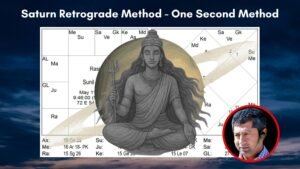
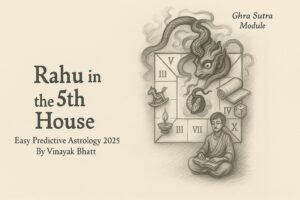

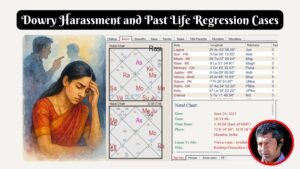
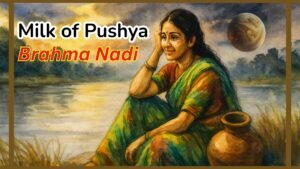
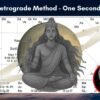
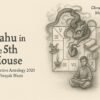

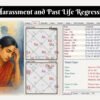
Leave a reply
You must be logged in to post a comment.